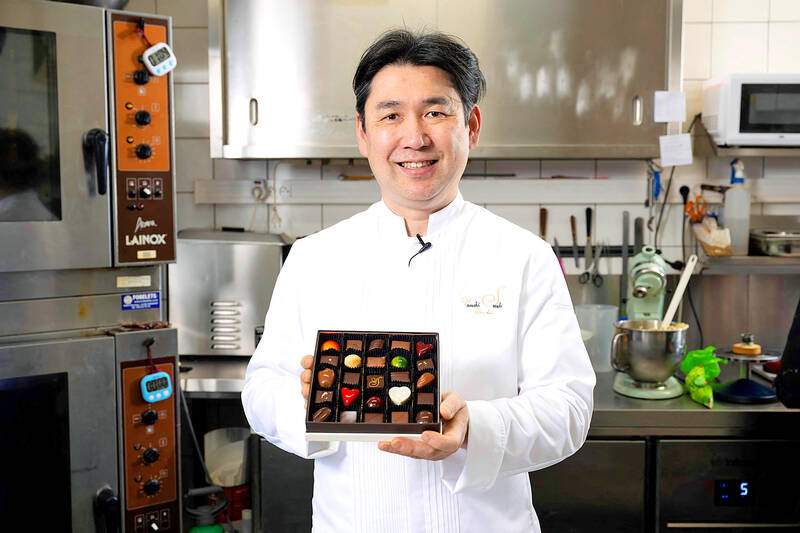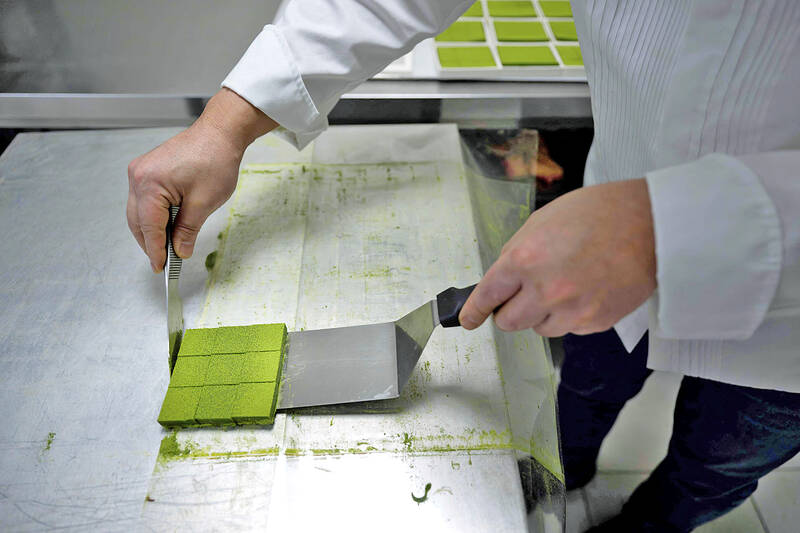When Yasushi Sasaki moved from Japan to Belgium at the age of 19, he spoke not a word of French and had no clue what he would do with his life.
Last month, at the age of 52, he was named Brussels’ chocolatier of the year by the prestigious Gault&Millau food guide — no small triumph in a country that considers itself the homeland of chocolate.
“Whenever I go home to Japan and mention Belgium, people say to me ‘Ahhh.... chocolate!” Sasaki said.

Photo: AFP
EXPERIMENTAL APPROACH
Dubbed a “flavor wizard” by the food guide, Sasaki conducts his experiments in a little workshop behind his store, in the Brussels commune of Woluwe-Saint-Pierre.
“Chocolate? From the moment I chose the profession it became my whole life,” he said. “It’s a hobby, a job, a pleasure.”

Photo: AFP
“I knew nothing, I started from scratch. But I think I made the right choice.”
Originally from Nara, near the city of Osaka, Sasaki draws inspiration from his homeland — but with a light touch. Not all Japanese flavors sit well with a chocolate ganache or praline.
“Green tea is very strong and marries very well. So does yuzu,” the citrus fruit, he explained as he doled out tips to his team of young Japanese staff. “Kaki and mandarin — nope.”
Sasaki selects his suppliers with care. The green tea for instance comes from Kyoto, where he orders directly from a cousin who works in the sector.
With cocoa prices soaring, he is also careful to control costs.
“We are artisans but we are also businesspeople,” he said. “To keep working as artisans, we have to sell what we make.”
‘MY OWN WAY’
Sasaki may have learned the trade in Brussels but he does not consider himself heir to a Belgian tradition.
“I have my own way, my own taste,” he said. “I know my strength is my own way, not copying other people.”
Today, Sasaki exports his creations back to his home country, where sales peak around Valentine’s Day, the chocolate moment of the year in Japan.
As Easter draws near, he is readying for another big highlight of the chocolate calendar.
Much as he is delighted to be honored by Gault&Millau, Sasaki would have one word of advice for the guidebook — to tip off its laureates before going public, so they have time to prepare.
“It’s a huge impact all of a sudden,” said Sasaki, whose turnover suddenly jumped by 20 to 30 percent.
For now, though, Sasaki has no plans to expand.
“I’ve been making chocolate for years. I’m just going to keep making good things, doing my thing,” he said.

That US assistance was a model for Taiwan’s spectacular development success was early recognized by policymakers and analysts. In a report to the US Congress for the fiscal year 1962, former President John F. Kennedy noted Taiwan’s “rapid economic growth,” was “producing a substantial net gain in living.” Kennedy had a stake in Taiwan’s achievements and the US’ official development assistance (ODA) in general: In September 1961, his entreaty to make the 1960s a “decade of development,” and an accompanying proposal for dedicated legislation to this end, had been formalized by congressional passage of the Foreign Assistance Act. Two

Despite the intense sunshine, we were hardly breaking a sweat as we cruised along the flat, dedicated bike lane, well protected from the heat by a canopy of trees. The electric assist on the bikes likely made a difference, too. Far removed from the bustle and noise of the Taichung traffic, we admired the serene rural scenery, making our way over rivers, alongside rice paddies and through pear orchards. Our route for the day covered two bike paths that connect in Fengyuan District (豐原) and are best done together. The Hou-Feng Bike Path (后豐鐵馬道) runs southward from Houli District (后里) while the

March 31 to April 6 On May 13, 1950, National Taiwan University Hospital otolaryngologist Su You-peng (蘇友鵬) was summoned to the director’s office. He thought someone had complained about him practicing the violin at night, but when he entered the room, he knew something was terribly wrong. He saw several burly men who appeared to be government secret agents, and three other resident doctors: internist Hsu Chiang (許強), dermatologist Hu Pao-chen (胡寶珍) and ophthalmologist Hu Hsin-lin (胡鑫麟). They were handcuffed, herded onto two jeeps and taken to the Secrecy Bureau (保密局) for questioning. Su was still in his doctor’s robes at

Mirror mirror on the wall, what’s the fairest Disney live-action remake of them all? Wait, mirror. Hold on a second. Maybe choosing from the likes of Alice in Wonderland (2010), Mulan (2020) and The Lion King (2019) isn’t such a good idea. Mirror, on second thought, what’s on Netflix? Even the most devoted fans would have to acknowledge that these have not been the most illustrious illustrations of Disney magic. At their best (Pete’s Dragon? Cinderella?) they breathe life into old classics that could use a little updating. At their worst, well, blue Will Smith. Given the rapacious rate of remakes in modern